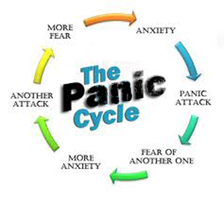Knowing basic first aid for panic attacks can prevent a full blown panic attack.
THE PANIC CYCLE
The cycle of events before a panic attack goes something like this:
- Something in your life, or just your thoughts, causes you to feel anxious.
- This raised anxiety speeds up your breathing because your body thinks there is an emergency. This is called hyperventilation.
- You begin to take in more oxygen than your body needs, and your carbon dioxide level drops.
- Without enough carbon dioxide, your blood cannot carry waste products away so a state of extreme emergency is created.
If you can recognize that you are starting to hyperventilate, learn to also recognize these symptoms so you can stop stop the panic attack from developing.
SYMPTOMS PRECEDING A PANIC ATTACK
- Increased sensitivity to light
- Tunnel or diminished vision
- Tight throat
- Indigestion
- Burning sensation in the stomach
- Acute hearing and intolerance to noise
- Missed heartbeats
- Nausea
- Light-headed and dizzy
- Pins & needles or localized burning sensations
- Cold flushes
- Hyperventilation
FIRST AID FOR PANIC ATTACKS
Immediately on recognizing these symptoms do the following to reduce the oxygen intake.
- Breathe into a paper bag, or even a paper envelope, as this will reduce the oxygen coming into your lungs.
- The same effect can be achieved by cupping your hands over your nose and mouth as you breathe.
- The best method and least obvious is to quickly start monitoring your breathing. As soon as you feel panicky, blow all your air out through your mouth. After that breathe in short breaths through your nose and exhale long breaths through your mouth. Repeat until the panicky sensation is gone.
- As panic attacks can also be the result of low blood sugar, especially for diabetics, suck on a glucose sweet or drink a non-diabetic cool drink. It must be non-diabetic because you need the sugar.
CHANGE YOUR THINKING
Next time you start a panic cycle, remind yourself that the sensations you are feeling are harmless, they are not going to kill you. The panic may be uncomfortable but it will pass.
Try to adopt a more casual attitude. so when you feel your heart start beating faster, say something to yourself like: Oops! Something set off my stress response, can’t see anything dangerous here. I’ll just wait for a few minutes for my brain and body to realize I’m not in any danger”. This type of self-talk is much better than “There’s something wrong with my heart! I’m having a heart attack, I’m dying!!”
A panic attack only lasts about 5 minutes. Look at your watch and do a count-down! Even tell the panic attack it can do its worst to you, you know that ultimately it won’t harm you.
Do not fight the panic attack. Your brain will think you need help in the fight and activate the stress response.
As your imagination can get carried away and stimulate a stress respond, trick the brain by doing relaxation exercises or even page through a magazine and get distracted while you wait for the sensation to pass over.
FINALLY …. Stop the panic attack from developing as soon as possible. You don’t want to cope with the additional fear of panic attacks.
